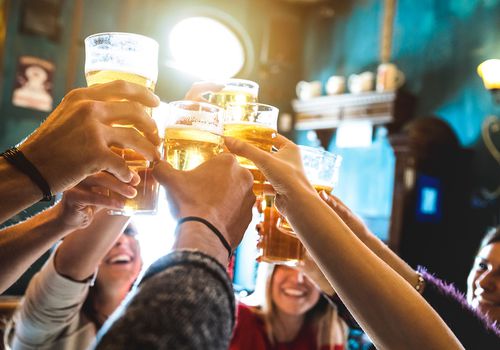
Wouldn’t you like to unwind after a long day at work with a glass of wine for dinner or by enjoying a few beers with your girl gang? Who wouldn’t, right? But if the hope of that calorie-rich high in the evening is making you skip meals during the day, then you could have ‘drunkorexia’.
What exactly is drunkorexia though?A new type of eating disorder, drunkorexia is when people restrict food consumption to balance out binge drinking. We’re not saying it, a research done by the University of South Australia is. Researchers from the Australian university found that many female university students restrict calorie consumption during the day to indulge in social drinking habits–so as to not gain weight.
As disturbing as willfully drinking on an empty stomach sounds, the sad part is women are more likely to fall prey to drunkorexia? According to the US Library of Medicine, women are more likely to cut back on food before drinking alcohol. The research also reflects the problematic mainstream culture which places women’s social attractiveness on being thin.
Although both men and women often conform to idealized body types, women are more likely to strive to being thin, thus making them likely to have drunkorexia.
Why do women indulge in drunkorexia?
The lead University of South Australia researcher, Dr Powell stated: “Factors that motivate young women to engage in this harmful and dangerous behavior include cultural norms, beliefs that drive self-worth, a sense of belonging, and interpersonal connectedness.”
Since a deep sense of disconnection with oneself and others often drive people to destructive behaviours, it’s important to open a conversation about mental health among young women. The sense of self-worth and belonging might make them override on starving themselves to be accepted while indulging in alcohol abuse. It’s important to ask women the question, ‘what makes you worthy?’
What are the health risks attached to it?
While binge drinking has its own health risks, its co-occurrence with anorexic tendencies is more concerning. Substituting food for low in calorie alcohol sounds like a jackpot, but that’s hardly the case.
Starving your body of food makes it miss out on important nutrients needed for sustenance. Also, alcohol has no nutritional benefits and it’s full of empty calories. Drunkorexia creates a vicious cycle where the pre-drinking starvation only leads to depletion of essential nutrients and binge drinking leads to weight gain.
Not to mention, the side effects of binge drinking on an empty stomach? It can lead to impaired coordination, stomach pain, slowed brain function, dizziness, mental confusion, slurred speech, constipation, mood swings, and listlessness.
The University of South Australia suggests that long-term empty alcohol consumption increases the risk of developing physical and psychological damage. Liver cirrhosis, nutritional deficits, hypoglycemia, brain and heart damage, blackouts, memory lapses, cognitive deficits, and depression are also on the horizon for people with drunkorexia.
How can you treat drunkorexia?
If you or someone you know is showing signs of drunkorexia such as starving during the day, drinking at night, purging and extreme mood swings, seek medical help immediately.
Dr Powell states: “Anyone who may be experiencing these thoughts or behaviors should seek professional help from specialists with experience in both eating and alcohol use issues.”
While intensive individual treatment is necessary, we must also open discussions about reducing the desire to lose weight or avoid gaining weight is one reason that a lot of people engage in drunkorexia.